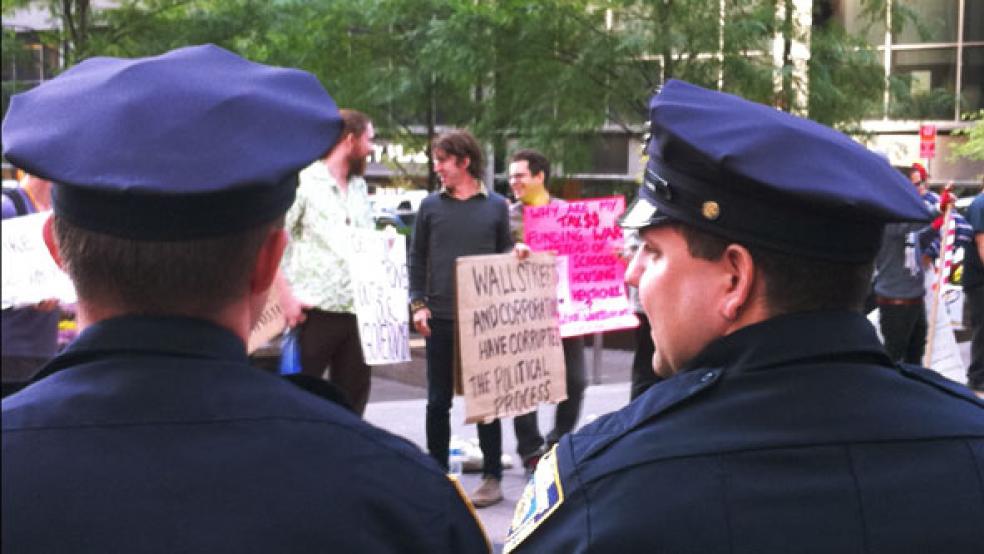When President Obama presented his plan Monday for reducing the country’s debt, he insisted that asking the country’s wealthiest taxpayers and big corporations to pay their fair share was not class warfare, just basic math. But at the same time on Wall Street, the streets leading to the New York Stock Exchange were barricaded by police in order to protect against what might easily be termed class warfare, or at least some relatively laid-back semblance of that.
“We’re here to show solidarity with the 99 percent of Americans who aren’t filthy rich,” said 22-year-old Jonah Lipman-Stern, echoing the sentiments of others in the crowd while at the same time strumming a ukulele.
For the third day in a row, protesters made their presence felt in Manhattan’s financial district. The demonstrators descended upon the neighborhood by the hundreds on Saturday in an attempt to “occupy Wall Street.” On their website , organizers — including Canada-based anti-consumerist media group Adbusters and a local group calling itself NYC General Assembly — say they were inspired by “our brothers and sisters in Egypt, Greece, Spain, and Iceland.” They and the protesters joining them had hoped to bring their version of Cairo’s Tahrir Square to Manhattan’s tiny Zuccotti Park, blocks from the stock exchange, and draw attention to what they call the injustices of the financial system and the gap between the top 1 percent of earners and everyone else. A smaller group of a couple hundred remained in the park on Monday, with some planning to stay for weeks or months. “We're still here. We intend to stay until we see movements toward real change in our country and the world,” read a post on the site Tuesday morning.
New York Mayor Michael Bloomberg warned last Friday that poverty and high unemployment could lead to riots in the U.S., but while one of the groups participating calls itself US Day of Rage, on Monday afternoon at least there was little visible fury at the protest site. But 22-year-old Candace Sneed explained that anger had brought her to be there.
“I’m here because I’m pissed off,” said Sneed. “I’m done with corporate America. It’s ruined so much…. It’s so wrong, and I’m sick of it. I need to do something about it because I can’t just be angry anymore. I need to sit out here with a sign, I need to yell, I need to march or else I’m going to go crazy.”
The Occupy Wall Street site reflected the tone of the protests for the most part: “The resistance continues at Liberty Plaza, with free pizza ;)”
Police had barricaded the street leading to the stock exchange and metal barriers surrounded the iconic statue of a charging bull slightly further down Broadway. Police on Monday arrested seven protesters for wearing masks and other relatively minor infractions, and dozens of uniformed officers stood watch around the renamed Liberty Park. But as the police looked on, many demonstrators casually engaged in what they called a general assembly, listening and repeating as one speaker after another discussed ideas for the movement, including proposals for a code of conduct for the movement. Some protesters were hunched over laptops, passing on their message through social media sites and streaming video. Others ambled among the sleeping bags, pizza boxes and peanut butter jars of the makeshift campsite; or played music; or slept.
Still, dissatisfaction with the economy and income inequality ran high. As the U.S. struggles to deal with a staggering debt burden and boost economic growth, many of the protesters pointed to corporate greed and Wall Street malfeasance as key causes of the problems facing the nation. The financial crisis of 2008 is still fresh in their minds. The meltdown would have been avoided if bankers and rating agencies had just been honest, said Allan Eaton, a 33-year-old who traveled from California to New York for last week’s 9/11 commemorations but stayed in part to be at the protest. “It could have been prevented if it weren’t for the people on the inside that were just getting rich off of it.”
Others expressed hope that the days spent downtown would be just the start of a bigger movement that could rid the political system of corporate influence. “With everyone suffering, eventually there will be a huge revolution and this is the start of it,” said Jon Prue, a 28-year-old from Scotland, Conn. “It has to be. Otherwise we’re all doomed.”





